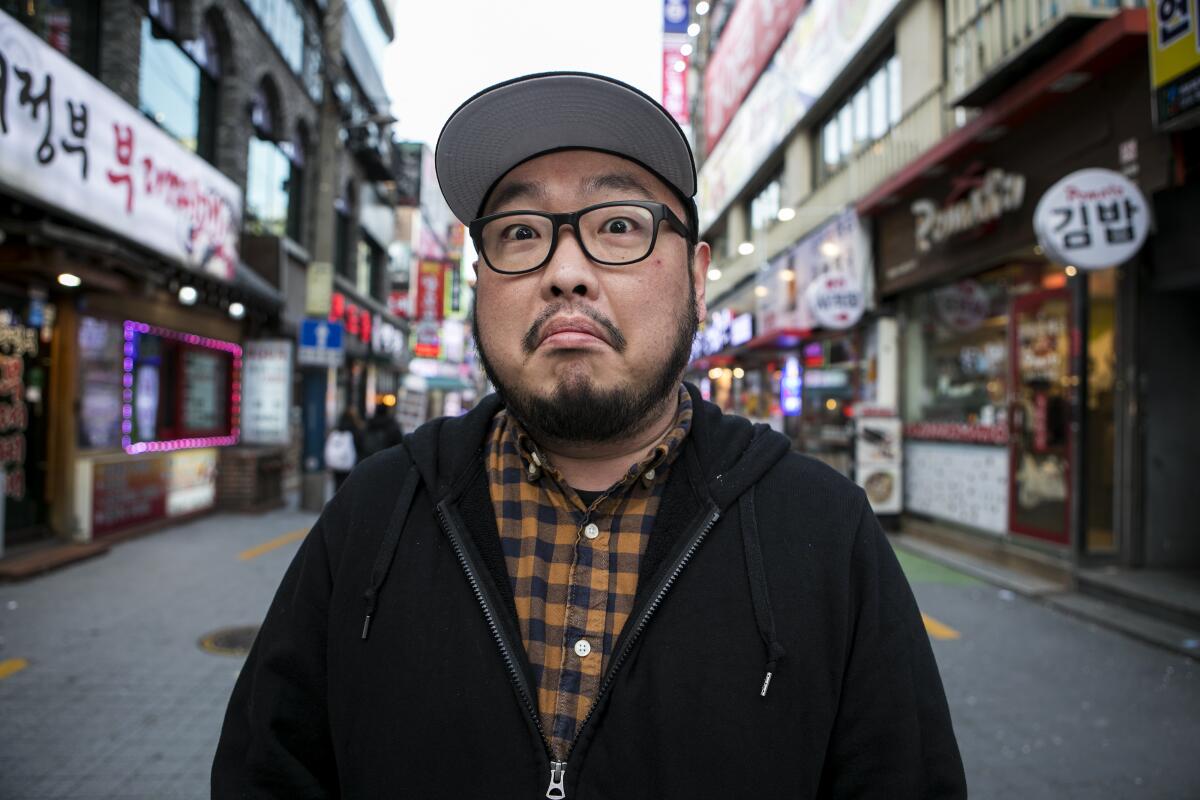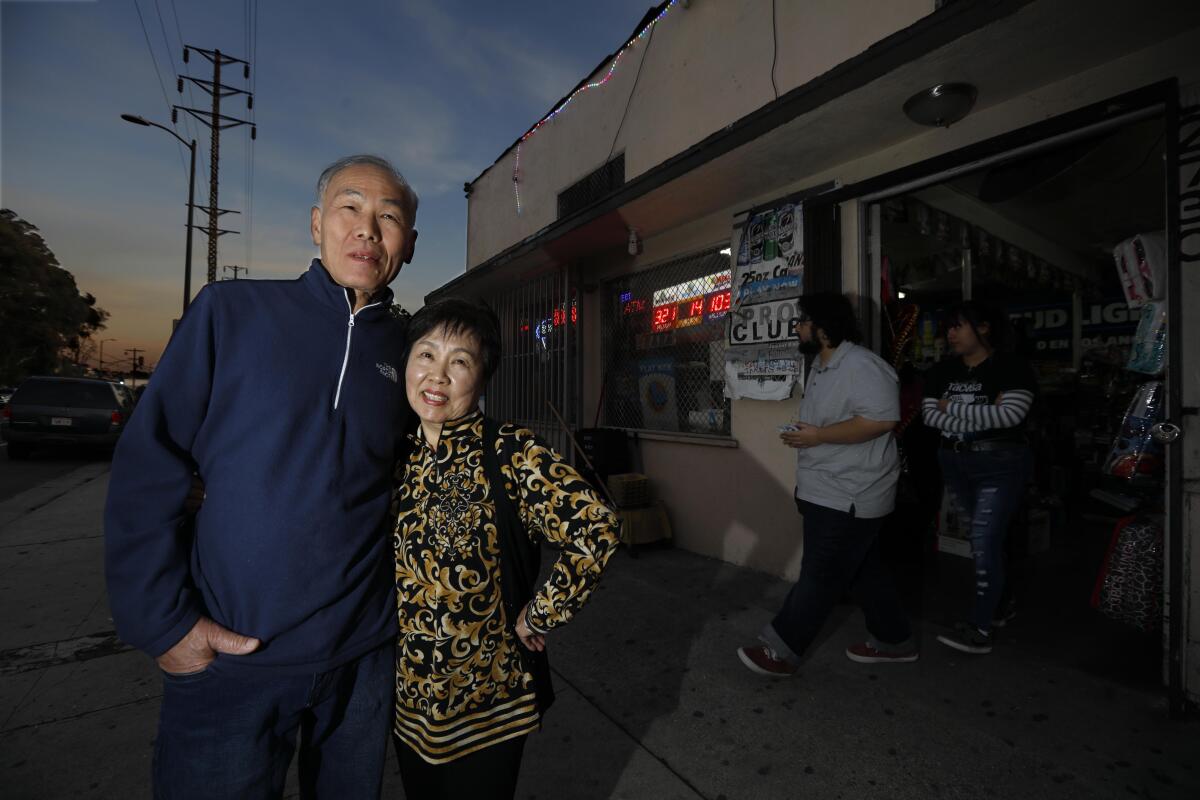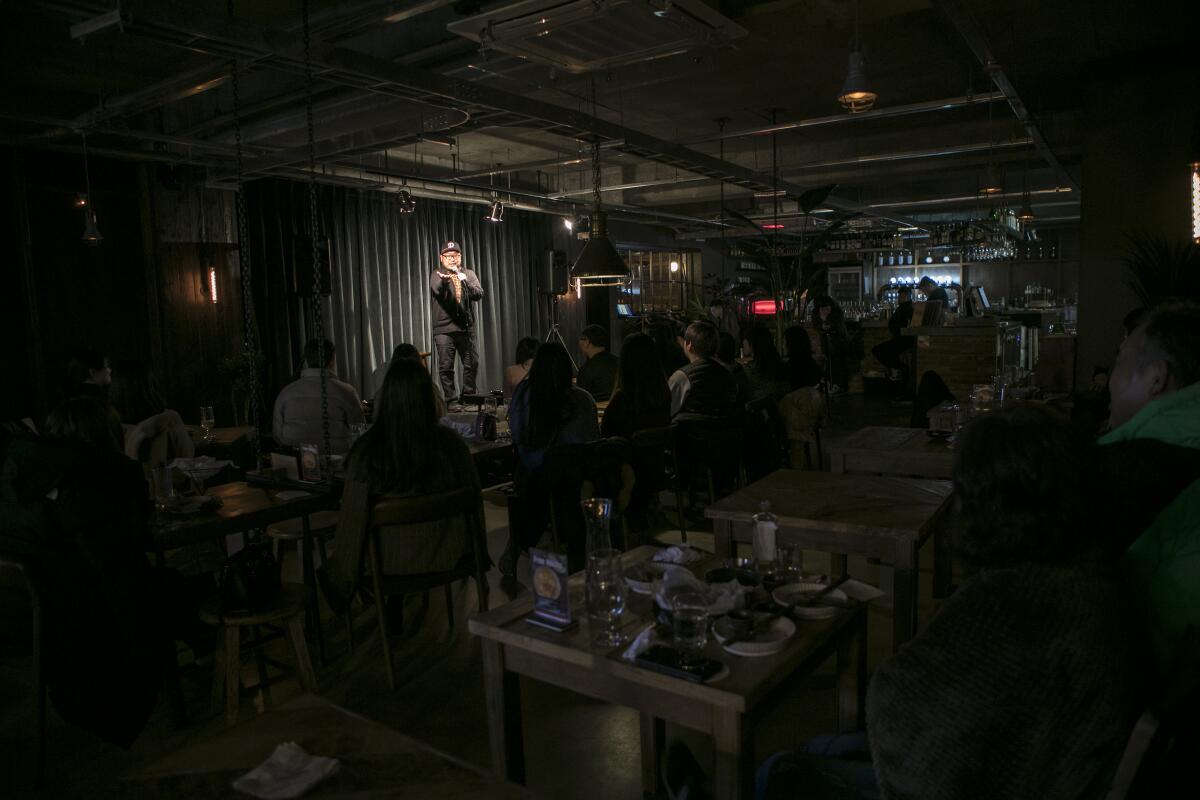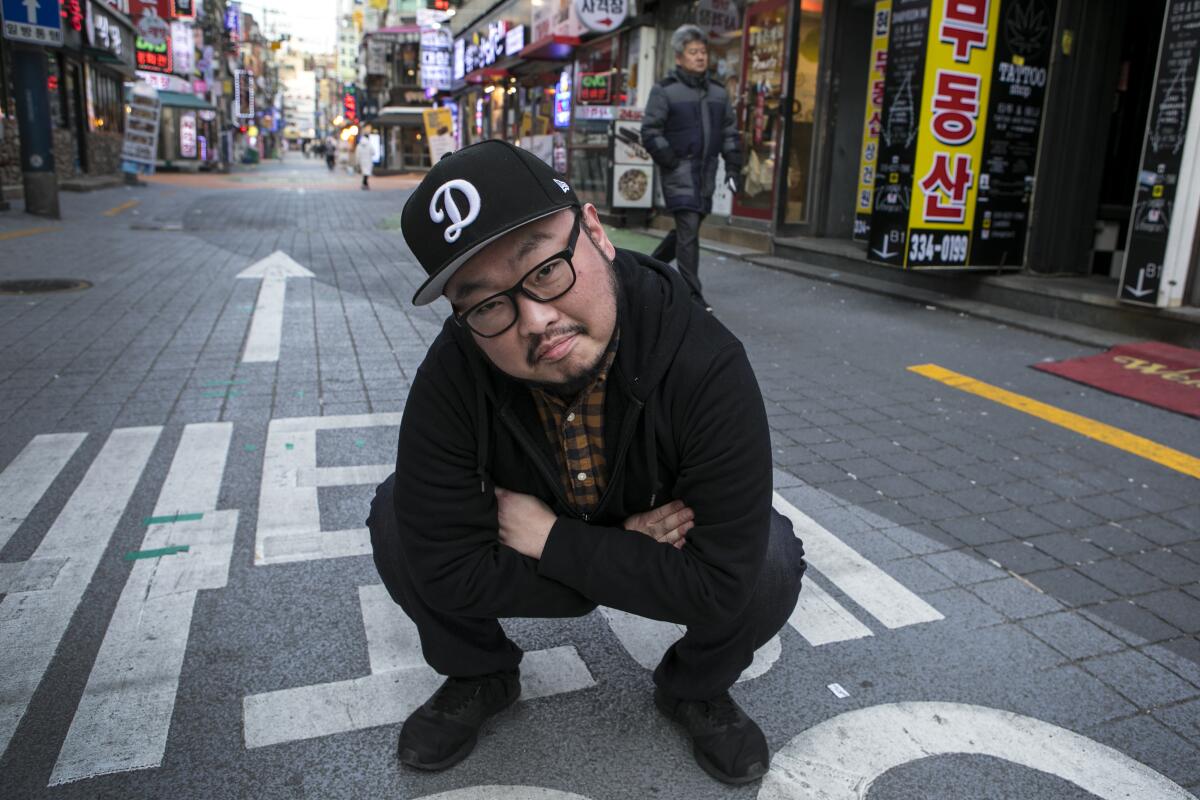A Korean American stand-up comic walks into a bar in Korea. Hilarity ensues — or so he hopes

- Share via
SEOUL — On a Thursday night in Seoul at a Beatles-themed basement pub, Danny Cho had one elbow cockily perched atop a mic stand as he launched into another joke.
The crowd was ready to dislike him — or so he thought. He’d been in the country barely three months, and it showed. His singsong Korean, sprinkled with English phrases, was a giveaway.
“So I looked into getting hair plugs,” he said, pulling back his beanie to reveal a receding hairline. “Then I thought about it, and I started feeling bad for the hair I have. These guys were loyal and stuck around. They hung in there.... If I get hair plugs, they’d be like, Where’d you come from?”
The crowd hooted and applauded.
Cho shifted into the role of a single hair: “I came from the armpit. Those guys came from the nape.”
The laughter wasn’t the side-splitting kind that comics live for, but not bad — especially for his first time performing in Korean, in a country where stand-up is in its infancy.
What makes something funny?
In the United States, where he was born and raised, the first child of newly arrived Korean immigrants, Cho managed to figure that out and build a career as a comedian.
Now at 37, he’s trying to figure it out all over again in a new language, a new country, a new culture that he was deeply connected to, yet barely understood.
::

In 1984, when Cho was 2, his parents purchased their piece of the American dream: a beer and wine store in Boyle Heights with a single-story two-bedroom house attached to the back.
They named the store for him, but got confused in their new language and wound up spelling it “Denny’s Market.”
Cho and his younger sister were the only Asian kids for blocks and at their neighborhood Catholic elementary school. He eventually found a way to fit in: humor.
“Either you gotta be funny or you gotta kick everyone’s ass for you to be accepted,” he explained recently.
Back then, ‘yo’ mama’ jokes were all the rage, and Cho was a master — quicker, sharper and raunchier than all his friends.
He was constantly honing his skills. From VHS tapes of Def Comedy Jam that kids passed around at school, he concluded that race was fertile ground for jokes.
Indeed, in South Pasadena, where his mother had lobbied to earn him a place in public high school despite living outside the district, all it took to crack up his friends were his East L.A. accent and some stories about his parents and their halting interactions with the Latino neighbors.
He’d riff about his homies, who gave him a street name — “Sleepy, ‘cuz of the eyes.”
‘Either you gotta be funny or you gotta kick everyone’s ass for you to be accepted.’
— Danny Cho
At home, the family spoke Korean. Colloquially, Cho sounded better than most Korean Americans, but without any formal training, his grammar and vocabulary were shaky. His parents drove him to Koreatown daily for taekwondo lessons, and he eventually became an instructor for younger children.
The summer after high school graduation, his friends found an open mic night at a dingy club in South L.A. and dared him to go onstage.
The emcee introduced him as “Danny Chow” and a gap-toothed woman in the audience heckled him — “Oh, he Chinese, he ain’t funny.” He showed her, lighting up the room with roaring laughter.
Throughout college at UCLA, where he majored in international economics, he performed at least once a week at Westwood bars and at the Laugh Factory.
“He had just started dabbling, but he was very edgy, with his background being Korean growing up in East L.A.,” said Paul “PK” Kim, who hosted Asian Nights at the Laugh Factory and regularly invited Cho to perform. “He was comfortable in his skin, not afraid to clown on you hard.”

Danny Cho performs at the Ice House.
But when it came time for a career, there were parental expectations. “As typical Koreans, we wanted him to have a normal, stable job,” recalled his father, Anthony Cho.
The day after graduation, Cho started work at a downtown business consulting firm.
::
Three years in, he was making six figures as a valuation consultant, sometimes working more than 100 hours a week — and still squeezing in time to perform.
He’d leave the office for a club, then head back to finish work, all the while longing to give comedy a try full time.
His parents remained in the dark about his stand-up. At their kitchen table, next to a glass case proudly displaying his taekwondo certificates and various academic awards, he told them he’d give himself five years to make comedy his vocation.
“It was like a sudden bolt of lightning out of a blue sky,” said his father.
The month after he quit, Cho made $60 from two gigs. But after a year, things started looking up. He filmed two Super Bowl commercials and other national spots, toured college campuses and U.S. Army bases.
On more than one occasion, his portly physique and wide forehead came in handy — to play late North Korean leader Kim Jong Il.
Onstage, he was an equal opportunity offender. He’d make fun of Asians — playing on stereotypes of Chinese, Japanese and Koreans — as well as Mexicans and African Americans. He’d joke about the neighbors he grew up with in East L.A.

Danny Cho plays late North Korean leader Kim Jong Il in an eHarmony ad with Grace Su.
One bit went like this: “Everyone there was Latino except me. That sucked, because I faced a lot of racism. Like every time a dog was missing in my neighborhood, 20 questions, man.”
Once the howling laughter began to die down, he’d lay on a thick Chicano accent: “Ey, Daniel, my perrito disappeared last night.”
::
The five-year mark came and went. What kept Cho going was the feeling of always being on the verge of a big break.
In good years, between touring and small roles on shows such as “Parks and Recreation” and “Dr. Ken,” he could nearly match his income as a consultant. A web series he created about partying in Koreatown, “Ktown Cowboys,” took off on YouTube and got hundreds of thousands of views.
But there were also dry spells, when he could barely cover his expenses.
“He’d call me whenever there’s good news. ‘I booked something. I’m going to be on TV,’” said his mother, Linda. “If I don’t hear from him for two or three months, maybe things aren’t going well.”

Danny Cho’s web series about partying in Koreatown, “Ktown Cowboys,” took off on YouTube.
Increasingly, it felt like he’d hit a wall in Hollywood, that opportunities for Asian American performers were always going to be limited.
“I said you know what, I need to just get the hell out of L.A. and figure out how to experience new things,” Cho said. “Maybe it’ll help me open something in my mind that I can write about.”
He’d only been to Seoul a few times, to visit friends or travel. But in late 2017, he sold his 2003 Acura and moved there.
His mother felt chagrined thinking of her son going back to the place she had left nearly four decades ago. It felt like retreat, not a way forward.
Cho planned to use South Korea as a base to perform in English comedy clubs around Asia, in places such as Hong Kong, Malaysia and Singapore.
It never occurred to him to perform in Korean. Not only was his Korean far from perfect, but stand-up just wasn’t a thing in South Korea. The few times he’d watched Korean TV comedy shows — when he had a Korean girlfriend — all the humor was sketch comedy, political satire and slapstick.
In the United States, it had taken generations of comics to transform stand-up into the part-observational, part-confessional art form that it is today.
The vulnerability and self-deprecation it required seemed particularly ill-suited for South Korea, where people are easily embarrassed and talking too much about oneself in public is almost verboten.
And nobody seemed to talk about the two things Cho always drew on for his comedy: race and sex.
Who would even recognize a cholo accent? And how would people react if he started talking about having sex when he was 13?
::
As it happened, Cho’s timing couldn’t have been better.
Ratings were sagging for the live-audience gag shows that had long been the stalwart of Korean comedy, and several of the main television stations scrapped them. On YouTube, people were adding Korean subtitles to clips of Dave Chappelle, Louis C.K. and other name-brand American comedians and racking up millions of views.
The month Cho arrived in Seoul, a couple of comedians whose television shows had been canceled began performing stand-up in Korean at Space The Beatles, experimenting with what was to them an entirely new format.
A mutual friend introduced them to Cho, who went to watch them perform.

Even in another language, he immediately realized they were stumbling on the rhythm that he knew so well from years of performing. Their setups ran too long, pauses were misplaced, the payoffs too small.
They were huge fans of stand-up — Chris Rock, Bill Burr, Jimmy O. Yang — and thrilled to receive critique from a genuine American comic.
But Cho could explain only so much — comedy relies on rhythm and mechanics not easily put in words.
“You know what,” he told his new friends, “let me perform next week.”
Over the next week, he wrote and wrote. Once again, like he’d been as a child in East L.A., he was the odd one out, viewing his new city with wonder and hilarity.
“I hadn’t worried about a 15-minute set in a long time,” he said. “It made me worried but excited — made me feel like I was starting again.”
That first Thursday night at the Beatles club, Cho opened by apologizing about his bad Korean — “I don’t care, no refunds” — then started riffing about the things he found puzzling about Korea.
“Ambulances. No one yields for ambulances...,” he said. “I was in a taxi once, and there were sirens from behind. I said, ‘Can we move to the side?’ and the driver goes, ‘Where is there to go?’ and just turned up the radio.”

Korean American stand-up comic Danny Cho performs in Korean in Seoul, about how no one yields to ambulances in his new home.
The crowd erupted into laughter as Cho leaned into the mic stand.
“I’m like, the music’s great,” he deadpanned, pausing as the audience howled. “But that guy’s dead.”
“You know what’s funnier? Chinese delivery somehow gets to my place in seven minutes,” he said. “So I told my friends, if I get hurt, instead of calling an ambulance....”
The crowd hooted and hollered and drowned him out with applause. He knew he could be funny in Korean.
::
Cho is now a regular on the budding South Korean stand-up circuit, often billed as a 17-year veteran comic from the birthplace of stand-up comedy: America.
“He seems like he can handle whatever situation that may come up onstage,” said Choi Jung-yoon, an up-and-comer who performs in Korean and English. “He clearly has the skills, like his punchline delivery.”
Little by little, Cho’s upped the raciness of his material, testing the limits of what he can get away with here.
“He’s had to connect with a brand-new audience he’s never encountered before. He’s pushing their buttons,” said Bobby Choy, a longtime friend and singer-songwriter who moved to Seoul a few years before Cho did. “His voice is still there. It’s still him, but he’s more handicapped.”

At one of Cho’s shows last year, Kim In-sook, a 42-year-old kindergarten teacher, was guffawing at a joke about his sexual prowess. Her husband repeatedly elbowed her in the side.
“He’s saying the things that we all feel,” she said.
In August, Cho performed his first full-hour set in Korean.
He talked about how he still was getting used to things Korea as he skipped from topic to topic.
Korea’s humidity: “Like living inside someone’s mouth.”
Slipping on ice: “I realized I’m old. When a young person falls, it’s funny.... When I fell, everyone was like ‘ahjussi, are you OK?’”
The Korean belief that falling asleep with a fan on will kill you: “I slept with it on for a month. I’m alive.... Then I got the electricity bill. I wanted to die.”
Between the quips, there were glimpses of introspection.
“It’s hard for Korean Americans to live in Korea. You get a bit of an identity crisis,” he told the crowd. “Like a bulgogi burger. When a Korean person eats it, it kind of tastes Korean, but it’s not Korean food. When an American person looks at it, it looks like a burger, but it’s not.”
In November, Cho performed in the first episode of a new stand-up comedy show on KBS, South Korea’s national broadcaster.
Still, after two years in Korea, he says he is still looking for his groove in his second language. He thinks in English and translates in his head.
At least his vocabulary has improved dramatically. He now knows the words for birth control, DUI checkpoint, even a few different ways to say oral sex that usually make people laugh.
Eventually, he plans to move back to California, with more stories to unspool onstage.
And maybe one day, if stand-up takes off in South Korea, people will remember the funny Korean American dude from Los Angeles who helped get it started.
More to Read
Sign up for Essential California
The most important California stories and recommendations in your inbox every morning.
You may occasionally receive promotional content from the Los Angeles Times.









